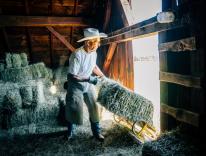In 2014, at the height of the Syrian Civil War, Bishop Hanna Jallouf, OFM, apostolic vicar of Aleppo and head of the Latin Church in Syria, was a parish priest in Knaye, one of three Christian villages in Syria’s western Idlib province, near the Turkish border. Along with twenty of his parishioners, Jallouf was kidnapped by members of the al-Nusra Front, which was then al-Qaeda affiliated, later renamed itself Hay’at Tahrir al-Sham (HTS), and now controls large parts of Syria after the overthrow of President Bashar al-Assad.
The al-Nusra Front abducted Jallouf after the Franciscan priest complained to an Islamic religious court about the seizure of church-owned properties in the small rural village of Qunaya. In retaliation, al-Nusra accused Jallouf of collaborating with the Assad regime and of refusing to surrender a portion of the olives harvested on church-owned land. Jallouf and his parishioners were held captive for five days. “All the rebel and terrorist groups—ISIS, al-Nusra, now HTS—have passed through this area,” Jallouf recently told SIR, the information agency of the Italian Episcopal Conference. “This is how we have been living since 2011, when the war broke out for the first time.”
After more than a decade of conflict, the ouster of Bashar al-Assad has thrown the future of Syria into doubt. Various ethnic and political factions threaten to drag the war-ravaged country into further chaos, while nearby countries and Islamist militants continue to exploit the turmoil: ISIS maintains a potent underground presence; Turkey is fighting with the Kurdish-led—and U.S.-backed—Syrian Democratic Forces, which controls a third of Syria; and, in the short time since Assad fled to Russia, Israel has seized more territory in the Golan Heights and launched more than five hundred airstrikes against Syrian military forces.
Syria’s religious and ethnic minorities—which include Kurds, Druze, Isma’ilis, and Alawites—are particularly vulnerable. Historically, these groups have supported the party in power to secure what Joseph Phillip Amar has described in these pages as “an uneasy peace for an embattled minority that has no control over its circumstances.” The fear is that, with Assad gone, this uneasy peace will crumble under the Islamist rule of HTS. The group’s leader, Ahmed al-Shara, broke away from al-Qaeda but is still on the United States’ terrorist watch list. (Until recently, al-Shara used the nom de guerre Abu Mohammad al-Jolani.) Despite repeated reassurances from HTS about forming a government of “unity and inclusiveness” and the group’s record of running the Idlib province with a disciplined pragmatism, no one is sure how it will govern the whole country—or if it can even hold on to power.
“The conflict is not over,” the UN special envoy for Syria said. “It will require a new miracle in the days and weeks ahead to ensure that things don’t go wrong in Syria.” This is a grave concern for the country’s dwindling Christian population, which has been facing persecution since the civil war began more than a decade ago.
Still, there are reasons for optimism. Jallouf’s subsequent experiences with HTS may augur well for Syrian Christians. Following his abduction in 2014, Jallouf established a relationship with local HTS leaders, who eventually agreed to return the church property they had seized and allowed him to celebrate liturgies, though the display of religious symbols on churches remains forbidden. A few days after Assad’s ouster, Jallouf spoke with al-Shara and one of his deputies. “He assured me that our dignity, our rights, our property, and our minorities will be respected, that there will be no harm. Our hope is that all the promises made will be kept.”
